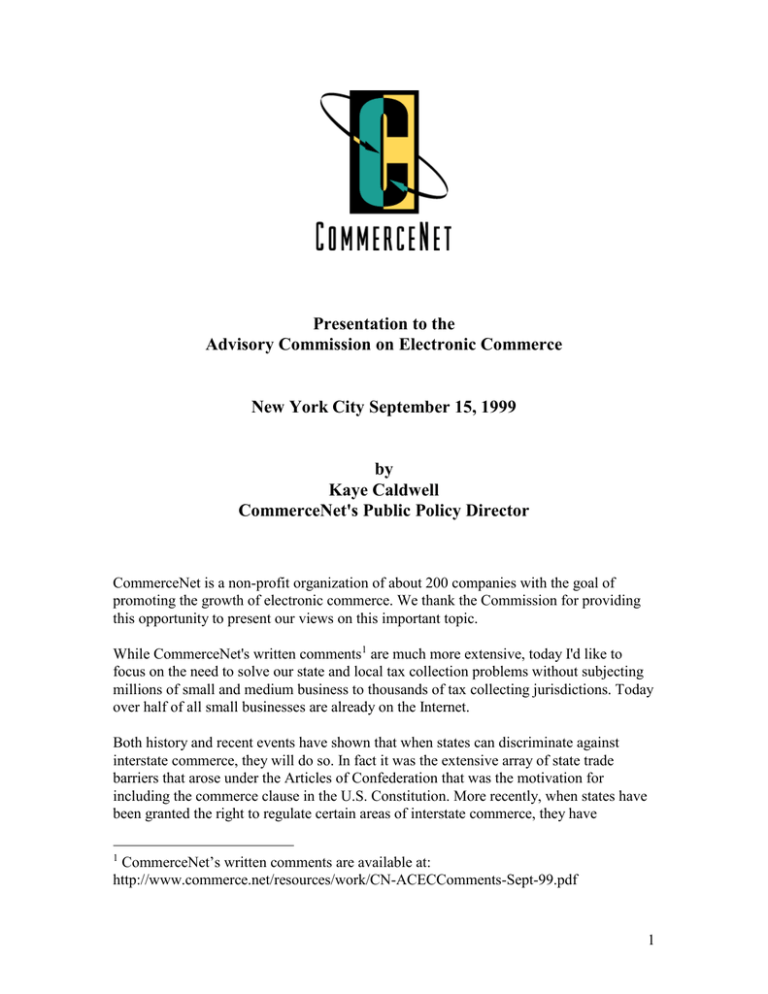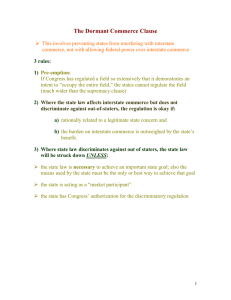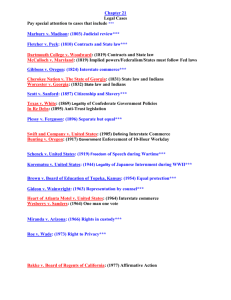Presentation to the Advisory Commission on Electronic Commerce
advertisement

Presentation to the Advisory Commission on Electronic Commerce New York City September 15, 1999 by Kaye Caldwell CommerceNet's Public Policy Director CommerceNet is a non-profit organization of about 200 companies with the goal of promoting the growth of electronic commerce. We thank the Commission for providing this opportunity to present our views on this important topic. While CommerceNet's written comments1 are much more extensive, today I'd like to focus on the need to solve our state and local tax collection problems without subjecting millions of small and medium business to thousands of tax collecting jurisdictions. Today over half of all small businesses are already on the Internet. Both history and recent events have shown that when states can discriminate against interstate commerce, they will do so. In fact it was the extensive array of state trade barriers that arose under the Articles of Confederation that was the motivation for including the commerce clause in the U.S. Constitution. More recently, when states have been granted the right to regulate certain areas of interstate commerce, they have CommerceNet’s written comments are available at: http://www.commerce.net/resources/work/CN-ACECComments-Sept-99.pdf 1 1 continued to create both tax-based and non-tax trade barriers. Details of those barriers can be found in CommerceNet's written comments and the documents cited in those comments. The real issue before the Commission is whether or not this country should continue to ensure the existence of a robust national marketplace, accessible by all businesses and consumers alike, or whether instead we will allow the states to impose protectionist tax systems that discriminate against interstate commerce. Even today multistate taxpayers are routinely subjected to unconstitutional discriminatory taxes, for which there is no effective remedy. It would be extremely unwise to subject the millions of small and medium businesses in the new Internet marketplace to taxing jurisdictions where they have no governmental representation. Furthermore, if we require every business in the United States to register as a tax collector in every state and local jurisdiction, there is nothing to stop those jurisdictions from imposing all kinds of additional taxes on them. Instead of abandoning our national marketplace to the whims of the states, Congress should protect our national marketplace by taking three steps: 1) First of all, Congress should provide a timely and effective mechanism for redress for multistate taxpayers that have unconstitutional taxes imposed on them. Suggested mechanisms for doing this are in our written comments. 2) Secondly, in 1998 Congress strengthened the role of the National Taxpayer Advocate within the IRS. Perhaps it is time to create a position in the Federal Government of a Multistate Taxpayer Advocate to provide for Federal oversight of state tax policies that affect interstate commerce. 3) Finally, Congress should redirect the states to a workable solution for the collection of use taxes on transactions in interstate commerce, by making it clear that the states will not be allowed to impose tax collection obligations extraterritorially. Fortunately, the Commission has before it an excellent proposal by Commissioner Andal that would redirect the states to find a workable solution for collection of their use taxes. Mr. Andal's proposal would NOT prevent the states from imposing use taxes on transactions in interstate commerce - it would merely require the states to find other ways of collecting those taxes besides imposing tax collections obligations on businesses that have no governmental representation in the taxing jurisdiction. While there are several possible mechanisms that the states could use, one has already been proven to work. That mechanism is that States could collect sales taxes on all retail sales that take place within their borders, regardless of whether the product is delivered in or out of the state, setting the tax rate to the same rate as that of the buyer's state. Thus the 2 states would merely repeal their export exemption. Sellers would then remit all taxes to their own state. The state would be free to agree with other states to exchange taxes collected on sales to those states' residents. This system has been proven to work by the International Fuel Tax Agreement, which created a similar system that currently collects fuel use taxes for all the continental states from multistate truckers. Further detail is available in our written comments. The American economy, fueled by the efficiencies technology has brought us, is the envy of the world. Let's not jeopardize our continued success by choking small and medium businesses with administrative tax burdens that threaten their newfound access to the national marketplace that the Internet gives us. The three actions mentioned would ensure that the U.S. maintains and further promotes a free, open marketplace that benefits both businesses and consumers in all areas of our Nation. CommerceNet thanks the Commission for this opportunity to speak with them today, and would be glad to answer any questions. Kaye Caldwell CommerceNet Public Policy Director KCaldwell@Commerce.net 3



